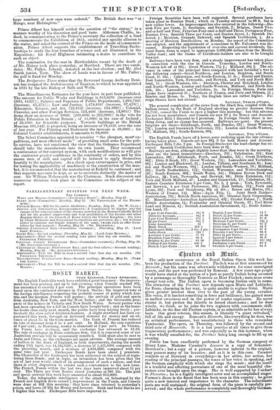Otairto mat gligir.
The only new occurrence at the Royal Italian Opera this week has been the production. of the Turitani. Pischck was at first announced for .Riccardo; but his name was afterwards withdrawn for some unassigned reason, and the part was performed by Ronconi. A few years ago people would have stared at the notion of a part so purely Italian being assumed by a personage so thoroughly Teutonic as Herr Pischek ; male nous avons change tout eels. The Italian opera is becoming Italian only in name. The attraction of the Puritani now depends upon Mario and Lablache; for Bosio, charming in her way, is quite unable to replace Grisi. Mario gives greater interest than ever to the part of the young cavalier. His voice, if it has lost something in force and brilliancy, has gained more in mellow sweetness and in the power of tender expression. He never strains it, but prefers the falsetto to forced chest-notes ; and he does wisely, we think, as he .joins the two registers with consummate Akin Lablache, in the fine old Puritan captain, is as admirable as he has always been. Our great veteran, this season, is literally "a giant refreshed," full of life and energy. Ronconi's Riccardo, like everything he does, was an artistical performance, but unsatisfactory to those who remember Tamburini. The opera, on Thursday, was followed by the second and third acts of Masanicllo. It is a bad practice at all times to give these fragmentary performances ; and was especially so in this instance, when it was wholly uncalled-for, the Turitani being long enough to fill up an evening.
_Fidelio has been excellently performed by the German company at Drury Lane. Madame Caradori's Leonora is a copy of Schrceder- Devrient's ; but a copy of a picture, however inferior to the original, may possess many of its beauties : and so it is in this case. Caradori reminds us of Devrient in everything-in her attire, her action, her reading of the principal passages, the tones of her voice in speaking, and the German simplicity with which she sings the music ; and the result is a truthful and affecting portraiture of one of the most beautiful cha- racters ever brought upon the stage. She is well supported by Beichart in Florestan ; he is a highly intelligent actor and an accomplished singer. Formes's Rocco is the finest that has been seen in this country ; he gives quite a new interest and importance to the character. The subordinate parts are well sustained ; the original form of the piece is carefully pre- served ; and the whole performance is completely and thoroughly German.


























 Previous page
Previous page